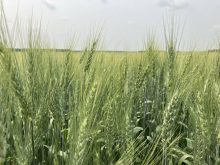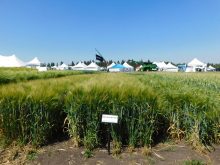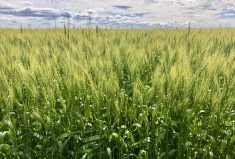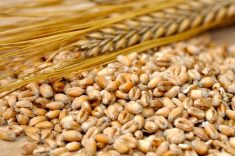Interested in growing a nice big crop of bragging rights?
Alberta Wheat is making it easier for the second edition of its Wheat Yield Challenge.
“We have tweaked the rules a bit this year, said Brian Kennedy, the crop commission’s grower relations and extension manager. “This year, we are going to compare what the grower achieved to the average published in Yield Alberta for their area.”
Yield Alberta, put out by the Agricultural Financial Services Corporation, has the average yield for each variety in 22 regions — called risk areas — in Alberta.
Read Also

Farming Smarter receives financial boost from Alberta government for potato research
Farming Smarter near Lethbridge got a boost to its research equipment, thanks to the Alberta government’s increase in funding for research associations.
Last year’s contest, which only drew about 20 entrants, had two categories — one for dryland production and one for irrigated land. The dryland winner was Alfred Vandelight from Eaglesham who grew 100 bushels of AC Stettler an acre while Matt Stanford of Magrath achieved a yield of 113 bushels per irrigated acre with AC Gateway.
Using local yield averages as the baseline instead of total yield opens things up, said Kennedy.
“For a winter wheat grower who gets 130 bushels an acre, and they’re five per cent above what’s published in Yield Alberta, they might not do as well as a grower in Oyen on dryland who may have achieved 55 bushels an acre, but it’s six per cent above what’s in their risk area,” he said.
The real purpose of the contest isn’t about topping your neighbours, but learning from them, he added.
“Wheat growers are always interested to see what their neighbours are up to, and how they can increase their yield through any agronomic activities that benefit their production,” said Kennedy.
“We and other wheat growers are interested in their agronomic recipe. A bit of it is luck, but there are some wheat growers who consistently seem to do a bit better than their neighbours. We’d like to share their agronomic information and their story and how they’re doing that in a sustainable manner.”
The entry form (due by July 31) and the harvest report form (due by Nov. 1) are available at the Alberta Wheat website.
Two winners will receive two passes and two hotel rooms for the Cereals Innovation/Prairie Barley Summit in Banff in December, as well as a $200 gift card for travel expenses. They will also be profiled in the commission’s GrainsWest magazine.
“We’d love to have 100 or 200 people enter,” said Kennedy. “It’s not that daunting. Throw in an entry form, see how you do. You’re competing against the average for that variety for your risk area.
“It’s head to head for all the varieties; winter wheat, CPS, CWRS, Canadian Northern, irrigated or dryland, and how you compare above the average for your area.”
Yield Alberta is available online via the AGCanada.com website. (The magazine is published by Glacier FarmMedia, the parent company of Alberta Farmer.)
















